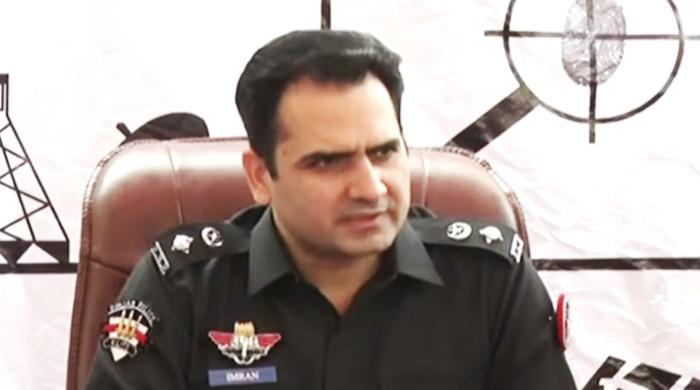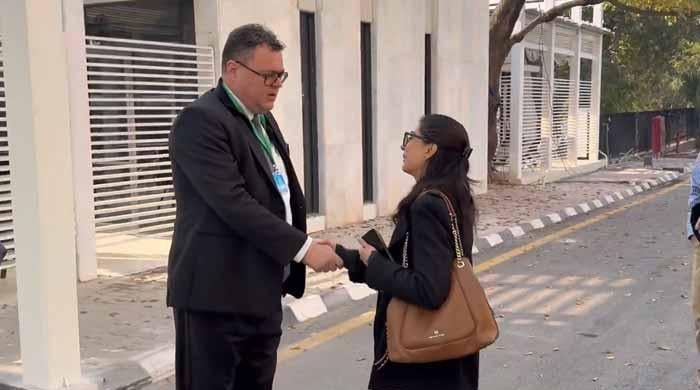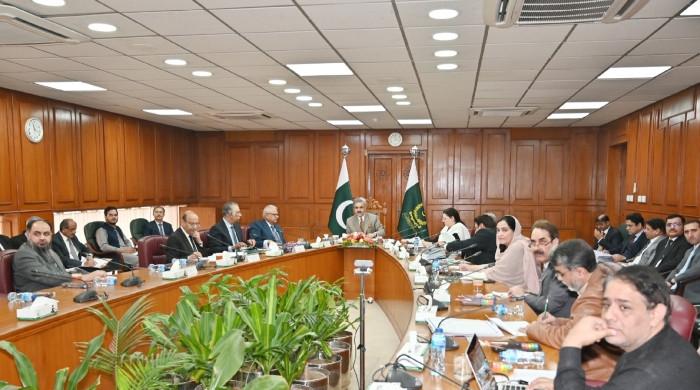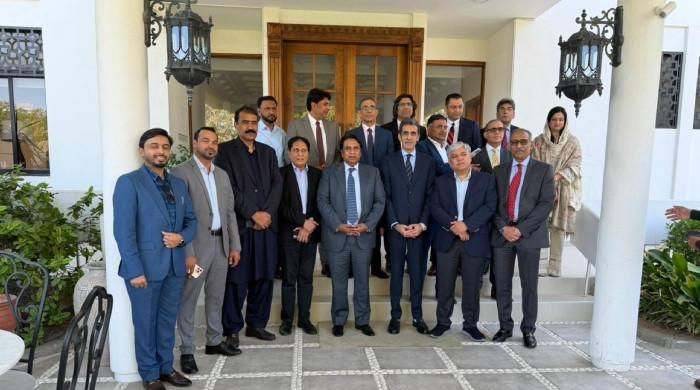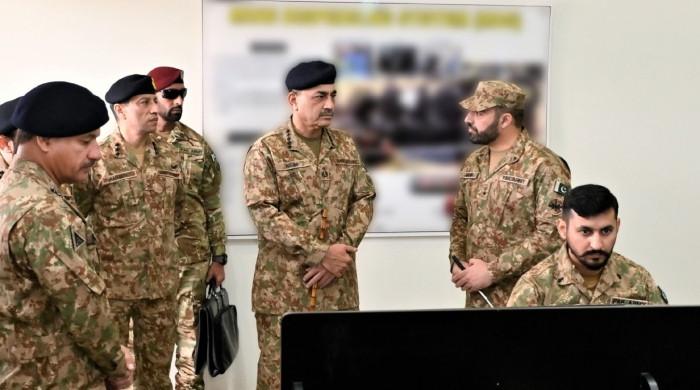Dissecting Riyadh Package amid Khashoggi disaster
Prime Minister Imran Khan took the right decision to participate in the 'Davos in the Desert' conference last month in Riyadh
November 10, 2018
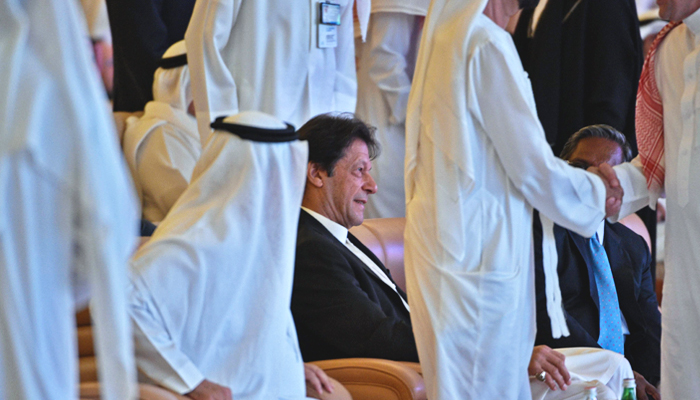
KARACHI: Despite all the hue and cry over Saudi journalist Jamal Khashoggi's horrifying murder, the world is still not serious to get to the bottom of his death. Over a month has passed, yet there has been no official word about the body of the slain reporter.
Even Turkish President Recep Tayyip Erdogan, who had threatened to reveal the "naked truth" surrounding the gruesome murder, has refrained from disclosing anything concrete.
In light of this, Prime Minister Imran Khan took the right decision to participate in the "Davos in the Desert" conference last month in Riyadh. It aimed at showing solidarity with a friendly nation that is facing crushing criticism from around the world and an incessant pressure of time and circumstances.
Equally, the Opposition senators in Pakistan have a point when they criticise the head-of-state for avoiding to disclose the terms of the "Riyadh Package", as it has been dubbed. The question, now, is why the premier has failed to take the full advantage of a minefield in his first innings in the Saudi capital?
The conference was symbolically snubbed by ministers from the United States, Britain, France, The Netherlands, and many other countries, in order to show solidarity with the Saudi diplomatic debacle. Under this pressure, some of these countries have squeezed Riyadh in order to secure lucrative deals.
Prime Minister Khan returned with only two words — "good news" — but no cash in hand and a commitment for deferred payments on the oil imports and a pledge to deposit $3 billion in the National Exchequer. On top of it, he engaged himself in brokering a mediation between the Kingdom and Yemen.
Khan is neither a statesperson nor a globally-acclaimed diplomat known for making such peace deals. He has not solved any domestic issue, let alone address an international crisis.
So far, however, he has only reflected — vaguely — on three foreign fronts: "Medina-like state (Madinay Ki Riyasat)," a welfare state like the West, and friendly relations with neighbouring countries.
One may claim anything but the world knows the PM's strengths, weaknesses, intentions, and inclinations better than his countrypeople.
However good Khan's approach is, the Yemen crisis is more complex than it appears.
Over decades, the country has remained a satellite Saudi state. In 2004, a small but powerful Houthi tribe started a rebellion against the Saleh government over underdevelopment issues in northern Yemen.
A decade later, this Iran-backed tribe succeeded in getting some powers. They strengthened themselves militarily and forced President Abdrabbuh Mansur Hadi to resign. Since November 2016, the Houthis, along with other political groups, is in power, only to be bombarded by the Saudi-led alliance.
At least this Houthi regime — that calls itself the "Revolutionary Government of Yemen" — didn’t ask for mediation. So should Information Minister Fawad Chaudhry be taken seriously for his claim that Khan had considered a tweet by Yemeni opposition leader who even he couldn’t name?
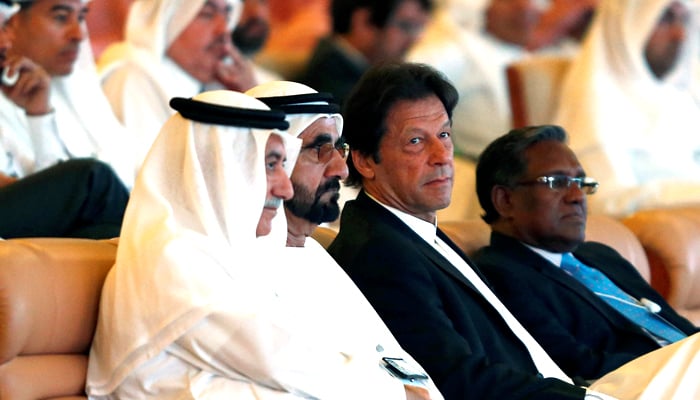
Here, a few questions can be raised:
1. How many of such crucial messages are ever conveyed through tweets?
2. How many of them are considered promptly?
3. Can a country that Riyadh has rescued economically be a neutral mediator?
4. What came out of the premier's mediation offer between Saudi Arabia and Iran a few months ago?
It has been admitted that Pakistan has long followed the Saudis' directions on international matters. And there should be no doubt that the nation will never know what conditions Pakistan has agreed to meet as payback for the so-called Saudi assistance.
Simply put, it’s the continuity of a culture of keeping the public in the dark or misinformed, at best, and over the years, the Pakistani people have become accustomed to this attitude.
The irony is that the man who takes credit of revolutionising the masses and keeping the public informed is unable to change the course. It was time for him to come clean and admit that his prior stance on Yemen was merely a sentimental outburst. It was also a moment to take the nation into confidence about the ground reality of our involvement, hidden under layers of a so-called "larger package".
Khan knows that the lingering civil war in Yemen is a thorn in the side of the Saudi-led alliance. King Salman's dignity is at stake as four years of bombing led by Riyadh has failed to restore the Hadi government from the ashes of utter destruction and has, instead, resulted in what the United Nations has termed the "world’s worst humanitarian crisis".
It is this war that drew criticism from every corner. By comparing Riyadh with Damascus, Khashoggi had advocated that Saudi Arabia must face the damage. He spoke in a tone considered rebellious as he once said in a Washington Post article: "Muslims around the world deserve to see [the] birthplace of Islam represent the ethics of Islam."
It is debatable whether what the dissident journalist said against the Saudi royalty was journalistic or political. He knew and feared a price may be paid but it was probably not in his wildest expectations that he would be slaughtered in the Kingdom's consulate in Istanbul, Turkey.
It is yet to be ascertained factually as to who ordered the Saudi hitmen to kill Khashoggi and dismember his body.
If the alleged audio recording of the gruesome killing is to be believed, Muhammad al-Otaibi, the Saudi consul-general, was heard saying: "Do this outside; you’re going to get me in trouble."
Like every other diplomat, al-Otaibi was most probably aware that overseas missions are bugged and their movements closely watched.
By ditching their own consul-general, whatever the assassins achieved was more than anyone could desire. They silenced a dissenting voice but, in doing so, levelled the sanctity of the very consulate Khashoggi was lured into.
Unfortunately, this unprecedented assassination will remain a warning sign to all nonconformists. They will now think twice before entering in their embassies.
President Erdogan knows that whatever the "naked truth" Turkey presents to the world, the Saudi monarch's position will remain the same. The Kingdom, which has shown interest in the US oil and military industries and fertilises their job market with $400 billion, will sail smooth.
At most, King Salman will only have to put his hand deeper into his pocket to save himself and his son, Crown Prince Mohammed bin Salman, whereas those, who avoided participation in the investment initiative, will start pecking on the grains again.
Bad luck for Pakistan that it remained the only country that neither took a raincheck nor cash through the opportunity.
No one expected the Pakistan Tehreek-e-Insaf (PTI) government to perform the way it did when it came to such art of tact and diplomacy. But that an all-rounder would achieve a "king pair" in his back-to-back visits is stunning.
The author is Controller News at Geo News and can be contacted at [email protected] or on Twitter (@NasimHaider2)
Disclaimer: The opinions expressed in this article are those of the author and do not necessarily reflect the official policy or position of Geo News or the Jang Group.




